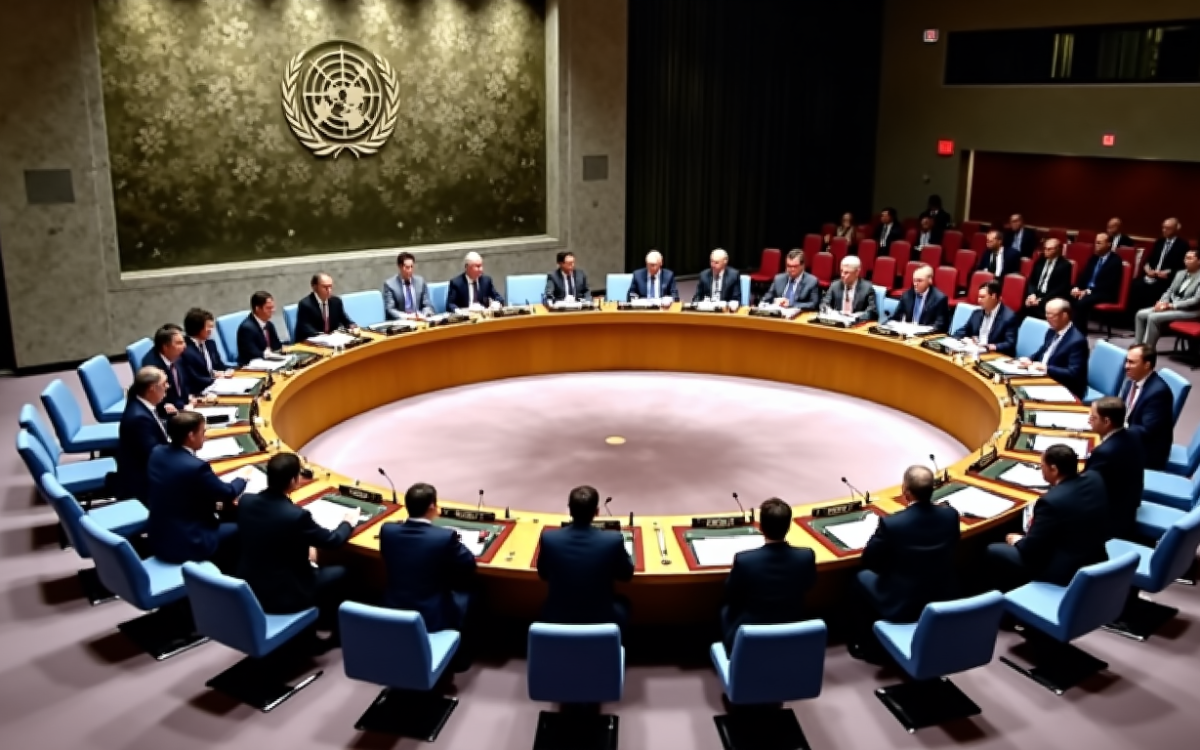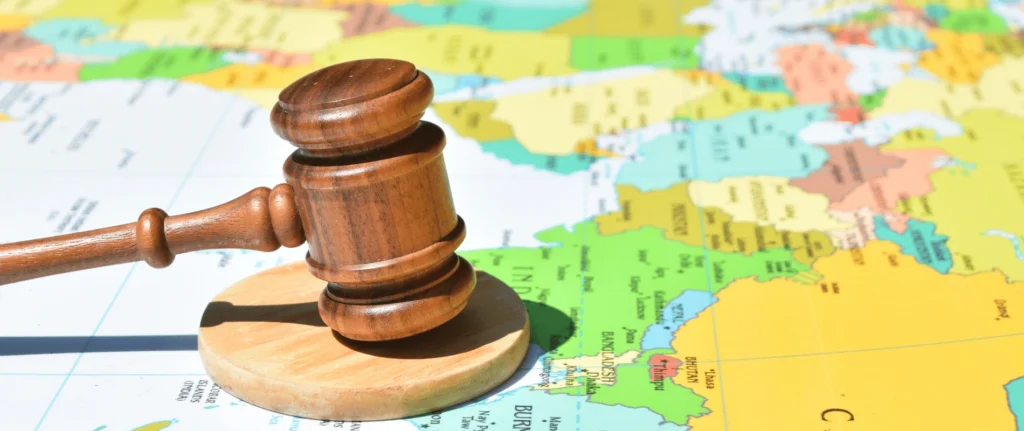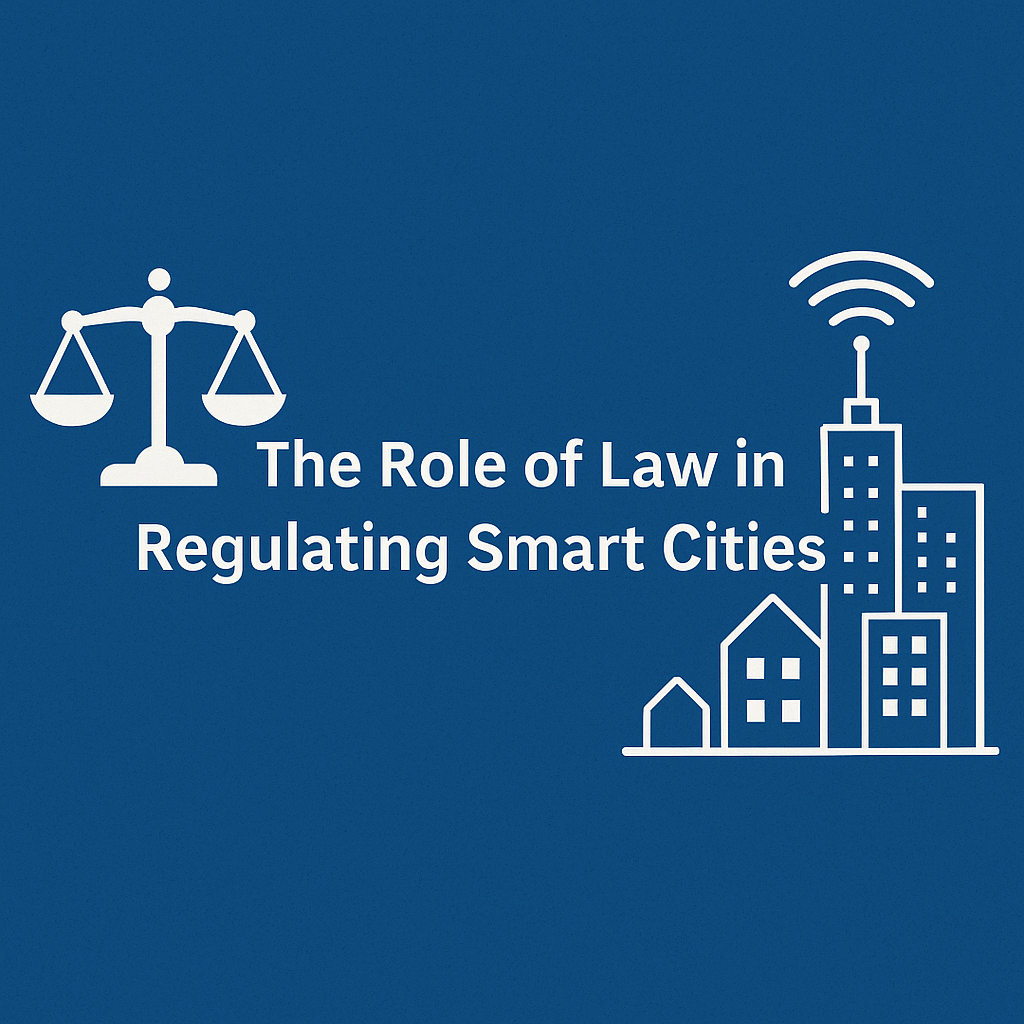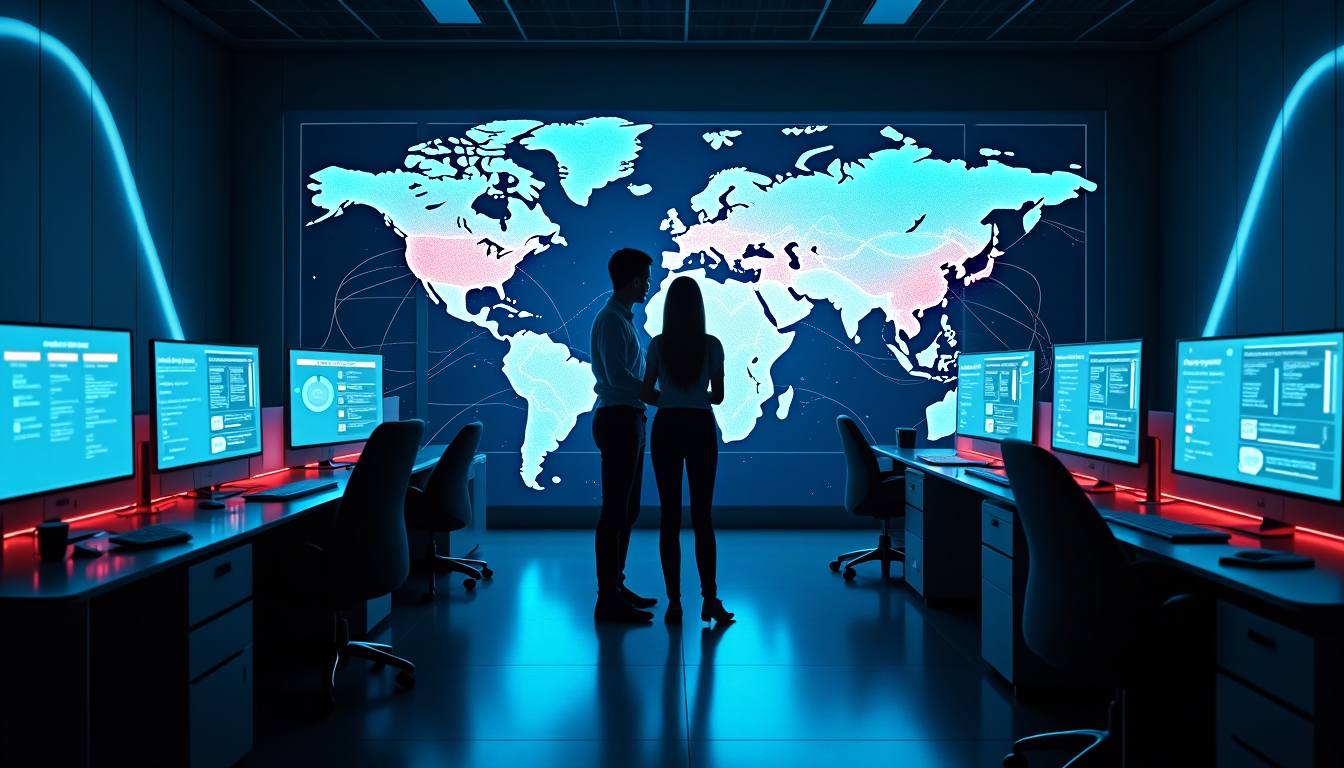The United Nations Security Council shows its strength by imposing trade sanctions on eight different countries, including Iraq, Libya, and Somalia. This power shapes international law and affects millions of lives worldwide.
Law enforcement usually happens within national borders. The international stage presents a much more complex picture. UN Law Enforcement relies on various tools, from charter-based bodies to specialized agencies and rapporteurs. People and NGOs can report human rights violations through proper channels. These systems don’t always work the same way. The World Trade Organization runs a tough dispute resolution system that works well. The International Court of Justice doesn’t deal very well with enforcing its judgments because of political limits.
This piece explores how UN Law Enforcement really works. You’ll learn about these complex systems and see why they sometimes miss their goals.
The UN Security Council: Primary Enforcer of International Law
The UN Security Council serves as the life-blood of international law enforcement. Its powers are way beyond the reach and influence of any other international body. This 77-year old principal organ of the UN has primary responsibility for maintaining international peace and security under Article 24 of the UN Charter. The Security Council stands apart from other UN organs. It makes binding decisions that all 193 member states must legally follow.
Legal Basis for Security Council Enforcement Actions
Chapter VII of the UN Charter gives the Security Council its enforcement powers. The Council determines if there are threats to peace, breaches of peace, or acts of aggression. This determination provides legal grounds to take action. Article 39 lets the Council recommend or decide on measures to maintain or restore international peace and security.
Article 25 requires all UN member states to “accept and carry out” Security Council decisions. This creates a binding legal duty that sets Security Council resolutions apart from other international tools. The Council turns political agreement into enforceable international law by invoking Chapter VII.
The Council usually doesn’t specify particular articles when it acts. It prefers broad references to Chapter VII. Yet, it has always determined a threat or breach of peace before taking enforcement action.
Economic Sanctions as Enforcement Tools
The Security Council uses economic sanctions more than any other enforcement tool. The Council has created 31 sanctions regimes against different countries and entities since 1966. Recent data shows 14 active sanctions regimes. These focus on supporting political conflict settlements, nuclear non-proliferation, and counter-terrorism efforts.
The Council’s sanctions have changed by a lot over time. Today’s sanctions typically include:
- Arms embargoes restricting weapons transfers
- Travel bans on designated individuals
- Asset freezes targeting specific entities and persons
- Financial or commodity restrictions
- Targeted trade limitations
These measures do more than just punish. Sanctions help support peaceful transitions, deter constitutional violations, constrain terrorism, protect human rights, and promote non-proliferation. Non-permanent Council members chair committees that manage each sanctions regime. Nine monitoring groups support 10 of the 14 active sanctions committees.
Sanctions work like “economic warfare” in today’s world, though they’re often seen as peaceful alternatives to war. The Council now applies sanctions more carefully. It considers their effect on targeted populations and has created systems like the focal point for de-listing and the Office of the Ombudsperson to ensure fairness.
Military Measures: When Force is Authorized
Article 42 lets the Security Council take military action if non-military measures fail to work. The Charter wanted member states to keep forces ready for Council deployment. This system never worked as planned.
The Council now authorizes force in three ways: peacekeeping operations, multinational forces, or regional organization interventions. The authorization of military force against Iraq after it invaded Kuwait proved highly effective.
The Council can also authorize force to protect people. Security Council Resolutions 1674 and 1706 confirmed the “responsibility to protect” populations from genocide, war crimes, ethnic cleansing, and crimes against humanity. This doctrine allows military intervention if a state fails to protect its people.
Limitations of Security Council Enforcement Powers
The Security Council’s extensive authority has important limits. The veto power of the five permanent members (China, France, Russia, UK, and USA) often blocks action that affects their interests. The Council becomes ineffective if a permanent member joins a conflict or supports one side.
The Council’s credibility suffers from weak follow-through and oversight. Studies show that “targeted” sanctions often harm civilian populations just like comprehensive sanctions.
No clear rules exist for how severe sanctions can be or how long they can last. Sanctions can be unlimited as long as the Council hasn’t met its goals. This sometimes hurts civilians too much.
The UN’s purposes, principles, and fundamental international law rules (jus cogens norms) limit the Council’s powers. The Council must not act against other UN purposes or override basic international law principles.
Domestic Courts: The Hidden Frontline of Enforcing International Laws
Domestic courts quietly serve as the primary channel to enforce international law, unlike the Security Council’s dramatic global interventions. The world relies on this decentralized system to turn abstract global rules into real-life results, though many overlook this fact when discussing international enforcement.
How National Courts Apply International Law Directly
Legal theorist Georges Scelle’s concept of dedoublement fonctionnel or “role splitting” explains how domestic courts enforce international law. These courts act both as national bodies and agents of the international community. This dual role naturally emerges from the decentralized structure of international legal systems.
National courts enforce international law by examining their governments’ actions and striking down those that break international commitments. People must try all local options before going to international forums. This requirement shows domestic courts’ vital position in enforcement.
Different countries give international laws varying levels of authority. Many states automatically accept customary international law, but they handle treaties differently. Some places put treaties above regular laws, while others let newer laws override treaty obligations. This creates a complex system for enforcement.
The Principle of Consistent Interpretation
Courts use consistent interpretation when international law cannot apply directly. They read national laws to match international obligations whenever possible. Several constitutions specifically require this approach.
This method works remarkably well. Japanese and German courts use the “indirect effect” theory to interpret domestic laws using international standards. Japanese courts, to cite an instance, use the International Convention on the Elimination of Racial Discrimination to understand “tort” in Japanese law.
Courts often achieve more through consistent interpretation than direct application. Many courts that hesitate to apply international law directly will gladly use it as an interpretive guide.
External Application Against Foreign States
Domestic courts also enforce international law against foreign states through:
- Civil litigation by victims seeking compensation for human rights violations
- Criminal prosecution of non-nationals for international crimes under universal jurisdiction
- Rejection of extradition or deportation based on international human rights standards
- Refusal to apply foreign laws or judgments that violate international norms
The Foreign Sovereign Immunities Act in the United States lets domestic courts handle cases involving foreign states, especially in commercial matters. Foreign states lose their immunity when their commercial activities affect the U.S. directly, when they violate property rights under international law, or in terrorism cases.
Case Study: Universal Jurisdiction in Practice
Universal jurisdiction shows how domestic courts enforce international law. This authority lets courts prosecute certain crimes regardless of location or perpetrator. Recent studies show universal jurisdiction cases continue to rise, contrary to some claims.
France and Germany lead these enforcement efforts and work together on Syria-related cases. Germany started the world’s first prosecution of state-sponsored torture in Syria in April 2020. This happened through exceptional cooperation among states, war crimes units, civil society, survivors, and international organizations.
Countries now create Special Investigation Units (SIUs) to strengthen these efforts. These specialized teams hunt war criminals within their borders. They benefit from diverse expertise and international partnerships.
Each country’s universal jurisdiction rules differ, which challenges lawyers building cases. Legal systems have different requirements based on crime types and jurisdictional connections.
Self-Help Mechanisms: How States Enforce Laws Against Each Other
States often take enforcement into their own hands if international institutions can’t or won’t enforce laws. International law allows states to use various self-help mechanisms to respond to violations without going through formal dispute systems.
Retorsion: Unfriendly but Legal Responses
Retorsion stands as the mildest form of self-help that includes actions which are unfriendly yet completely lawful. Unlike other enforcement tools, retorsion doesn’t break any international legal obligations of the acting state. These measures work within a state’s sovereign powers to show disapproval.
Common examples of retorsion include:
- Prohibiting or restricting diplomatic relations
- Imposing trade embargoes or economic restrictions
- Withdrawing voluntary aid programs
- Expelling diplomats (declaring them persona non grata)
States don’t need to justify retorsion measures under international law, which gives them flexibility in application. They can use these measures to influence other states’ behavior, even in response to destabilizing cyber activities. States usually opt for balanced measures to pursue “just and sound politics,” though no formal regulations exist.
Countermeasures: The Rules of Legal Retaliation
Countermeasures differ from retorsion because they would normally violate international obligations but become legal when used to respond to another state’s wrongful act. The term “countermeasures” has replaced “reprisals” to set them apart from armed reprisals, which the UN Charter prohibits.
Legal countermeasures must meet specific conditions:
- They must address a prior internationally wrongful act and want to stop it and get reparation
- They must match the injury suffered (proportionality)
- States must notify and offer negotiations
- States must stop countermeasures quickly once the wrongful act ends
Proportionality covers both quantity and quality, including how serious the breach was and how important the violated rule is. Countermeasures can’t affect obligations about using force, protecting human rights, or humanitarian law requirements.
Third-Party Countermeasures for Serious Violations
Legal experts still debate whether states not directly harmed by violations can take countermeasures. Yet, more countries now accept “third-party countermeasures” for serious breaches of community norms.
The International Law Commission left open the question of whether indirectly injured states could use countermeasures. This topic created heated debates during the drafting of Articles on State Responsibility.
Recent cases with Libya, Syria, and Russia show how state practices have evolved. Switzerland froze Colonel Gaddafi’s and the Libyan Central Bank’s assets in February 2011 to respond to violent repression. The Arab League suspended Libya’s membership too. The EU imposed sanctions against Syria in May 2011 because of massive human rights violations, and the Arab League and Turkey added their own restrictions.
Legal scholars now say that state practice on third-party countermeasures has become “sufficiently widespread, representative as well as consistent to form the basis of a rule of customary international law.” What started as a limited concept has grown into a common practice in international relations.
International Courts and Tribunals: Judicial Enforcement Systems
International judicial bodies serve as a cornerstone in enforcing laws beyond borders. Their success depends heavily on how they operate and the tools they have to enforce decisions. Legal systems around the world show stark differences in their authority – some have reliable tools to ensure compliance while others struggle to get their rulings respected.
The International Court of Justice's Enforcement Challenges
The International Court of Justice (ICJ), the UN’s main judicial body, faces major hurdles in enforcing its decisions. Domestic courts have enforcement officers and direct powers, but the ICJ lacks these tools. The UN Security Council holds enforcement responsibility under Article 94(2) of the UN Charter. When parties fail to follow an ICJ judgment, the other side “may have recourse to the Security Council”.
This enforcement system has a fundamental weakness. The Security Council can act only “if it deems necessary”. The Charter’s authors made this choice deliberately. They rejected an earlier plan that would have required the Council to enforce ICJ judgments.
Real-life cases show the problems with this setup. Nicaragua asked the Security Council in 1986 to enforce an ICJ judgment against the United States. A U.S. veto killed the draft resolution that called for “full and immediate compliance”. Such cases reveal how politics can derail judicial enforcement, especially when permanent members have stakes in the outcome.
Criminal Tribunals with Direct Enforcement Powers
International criminal courts take a more direct approach to enforcement. The International Criminal Court (ICC), created by the Rome Statute, works independently but cooperates with the UN. Under Article 13(b) of the Rome Statute, the Security Council can ask the ICC Prosecutor to investigate situations.
The Security Council has created two crucial temporary criminal courts: the International Criminal Tribunal for the Former Yugoslavia (ICTY) and the International Criminal Tribunal for Rwanda (ICTR). These courts could punish individuals for contempt but couldn’t force states to comply. They relied on the Security Council, their parent organization, to impose sanctions on uncooperative states.
Regional Courts with Stronger Compliance Records
Regional courts achieve better compliance than their global counterparts. Their success comes from stronger ties to local legal systems and better enforcement tools. These tribunals benefit because member states share similar cultural and legal backgrounds, which helps implement judgments smoothly.
The European Court of Human Rights shows this approach works well. Countries regularly change their laws to follow its judgments. The Inter-American Court of Human Rights has also developed creative solutions that lead to better compliance.
The WTO Dispute Settlement System: A Model for Enforcement?
The World Trade Organization’s dispute system stands out as one of the most effective legal enforcement mechanisms in the international arena. It works well because it has:
- Clear, well-laid-out processes with specific deadlines
- Rulings that pass automatically unless everyone rejects them
- Several enforcement stages that focus on compliance
- Permission to use proportional retaliation when needed
Disputes start with talks between parties. If talks fail, a panel forms. The WTO’s Dispute Settlement Body (DSB), which includes all WTO members, has exclusive power to create panels, accept their findings, and allow retaliation when parties don’t comply.
The losing side cannot block rulings – a big step forward from earlier systems. The DSB can authorize trade sanctions if the losing party refuses to comply, giving the system real teeth.
More than 350 rulings since 1995 prove that international enforcement works when systems rely on automatic processes rather than political decisions.
Compliance Control: The Quiet Power of Monitoring and Reporting
International law relies on a subtle system of monitoring and compliance that goes beyond traditional enforcement. This approach uses visibility and transparency rather than force. The system works by setting standards and bringing issues into public view.
Treaty-Based Reporting Systems
Independent expert committees watch over how member states follow human rights treaties. Member states need to submit regular reports about how they follow treaty rules. These committees review the reports and give practical suggestions called “Concluding Observations” to help states improve. UN agencies, civil society groups, and governments use these reports as vital reference points.
The UN Office of the High Commissioner for Human Rights in Geneva supports ten treaty bodies. These bodies keep track of the main international human rights treaties [64,65].
The Role of Special Rapporteurs and Fact-Finding Missions
Special Rapporteurs work as independent experts who monitor specific human rights issues or countries. They collect information from various sources and visit countries. Their findings go to the Human Rights Council and UN General Assembly.
Fact-finding missions and inquiry commissions break down serious violations of international humanitarian and human rights law. They document what happened during incidents and check if laws were broken. The teams identify possible wrongdoers and suggest what should happen next. Their value comes from creating historical records that help future investigations.
Peer Review Mechanisms
States assess each other’s compliance with international obligations through peer review, which has proven to work well. The OECD Working Group on Bribery shows this approach at its best. They use what they call a “dynamic process of mutual evaluation and peer pressure” to curb corruption.
Member state experts regularly check compliance through questionnaires and site visits. They also hold group discussions. This makes state performance transparent, creates pressure among peers, and helps everyone learn from each other.
How 'Naming and Shaming' Actually Works
The success of “naming and shaming” depends on specific factors. A newer study, published by researchers, shows it works best with countries that have strong political institutions, care deeply about the issue, and make serious international commitments.
Interestingly, criticism from friendly nations often works better than from rivals. When allies point out problems with a nation’s practices, it signals that something needs attention. But when rivals criticize, it can backfire. Leaders might gain more support at home by standing up to international pressure.
Non-State Actors: The Rising Enforcers of International Law
Non-state actors now play a bigger role in shaping international law enforcement beyond traditional government authorities. These organizations use different ways to track violations, push for accountability, and sometimes enforce international legal standards themselves.
NGOs as Monitors and Whistleblowers
NGOs act as watchdogs in the international legal system. Amnesty International and Human Rights Watch spend thousands of hours investigating conflict zones and talking to victims and witnesses to document abuses. These organizations find creative ways to expose violations in restricted areas. They conduct remote interviews, gather testimonies at borders, and use satellite technology.
NGOs have become trusted partners for people who want to report wrongdoing anonymously. Research from Indonesia shows that people prefer to report local corruption to NGOs instead of police or prosecutors. Organizations like Madagascar’s Alliance Voahary Gasy let people report environmental crimes through anonymous hotlines.
Corporations Enforcing Human Rights Standards
Big companies now take on enforcement roles through human rights checks. The UN Guiding Principles on Business and Human Rights require companies to spot, prevent, and report any negative effects on human rights in their operations.
Many countries now require companies to be accountable for human rights. Large companies doing business in California must share what they do to fight human trafficking under the California Transparency in Supply Chains Act. French law goes further – companies with over 5,000 employees must publish yearly plans that address human rights risks.
Media Organizations Exposing Violations
News outlets play a vital role by exposing international law violations and pushing for accountability. Dr. Li Wenliang’s story showed media’s importance when Chinese authorities tried to silence him during the COVID-19 pandemic.
Digital technology has made media more powerful at enforcing laws. They can now quickly document and share evidence. But social media can also cause problems – Amnesty International revealed how Facebook’s systems fueled ethnic violence during Ethiopia’s conflict.
Individual Citizens as International Law Enforcers
Regular citizens now have more power to enforce international law. The International Court of Justice recognized in the LaGrand case that individuals can be subjects of international law. This means people not only have rights but also responsibilities under international law.
Whistleblowers show how individuals can make a difference. PricewaterhouseCoopers studies found they catch more fraud and abuse than auditors. Yet they still need better protection. While 167 countries have signed the UN Convention Against Corruption, many don’t properly protect whistleblowers.
Conclusion
Global law enforcement works through a network of systems that uphold worldwide rules and standards. The UN Security Council leads enforcement efforts, but domestic courts play a vital role in implementing international law. States hold much power through self-help tools like retorsion and countermeasures when standard procedures don’t work.
International courts show varying levels of success. The World Trade Organization’s dispute system has become a soaring win, yet bodies like the International Court of Justice struggle with enforcement. Systems that monitor compliance through reports, special rapporteurs, and peer reviews create significant accountability without direct power to enforce.
The landscape now includes powerful non-state players. NGOs, corporations, media groups, and citizens actively expose violations and push for accountability. Their impact shows how international law enforcement reaches way beyond traditional state-focused methods.
This diverse system adapts and grows despite its limits. Every part of it – from official institutions to ground-level participants – helps maintain international order uniquely. Knowledge of these systems helps us grasp the challenges and possibilities in making international law work effectively.








2 Comments
Quo est sed eos aut enim Id est quae reprehenderit non reprehenderit. Nulla possimus veritatis laudantium quidem Voluptatem eum adipisci expedita tenetur Rem minus illum accusantium non consectetur itaque deleniti. quo culpa facere est quos. Et ipsam maiores ut est
Nihil ut reprehenderit rem blanditiis Voluptatem ut deleniti sed. Minus ipsam earum Non placeat delectus quis maiores pariatur rerum. Voluptatibus dolores deleniti aut reiciendis Adipisci aperiam similique ipsum qui. Quidem ipsum voluptatem aut. Sint enim qui qui cumque Quas consectetur neque excepturi non ut perspiciatis. facilis neque esse praesentium repudiandae. Eveniet doloremque sequi maxime optio. Ut sed asperiores qui consequatur ipsam.